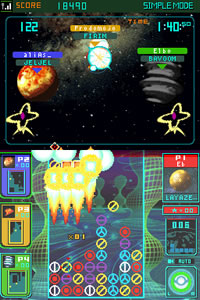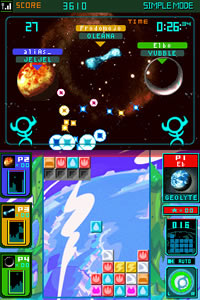A rocket in your pocket.
Like drooling, hypnotized babies, gamers just can’t stop playing with blocks. Small blocks, big blocks, animal blocks, musical blocks ” it doesn’t matter what adjective you stick before it, because if it’s got a couple sides and is looking for a place to call home, we’ll shuffle its ass off and stick it somewhere cozy. Puzzle games are our black tar heroin.
And if game developers are our drug dealers, Q Entertainment quite literally rules the block, having recently created legions of addicts thanks to their PSP breakout hit Lumines. Like any good businessman, the developer doesn’t discriminate in its clientele, which helps explain the fact that they’re now responsible for the Nintendo DS version of a block crack pipe in the solid puzzler, Meteos.
I don’t know why anyone needs a story in a game featuring row after row of colored blocks, but guess what, you get one anyway. The universe is being threatened by an evil planet called Meteo, which has been releasing phantasmagoric matter, called Meteos, that steals the sparkle of the universe. Jesus. But then someone – probably Jeff Goldblum – figured out that when a few like-colored Meteos touch, they fuse and blast off into space. Hence, each planet defends itself by fusing Meteos while waiting for a special warship, called the Metamo Ark, to find the original Meteo and blow it up.
In other words, it’s your job to fuse phantasmagoric matter into little rockets in order to combat a sentient planet.
In other other words, you play with blocks. You can try pretending the story never happened. Good luck with that.
Incomprehensible plot notwithstanding, Meteos is pretty simple. Meteos (blocks) fall from the sky and clutter up the screen. To clear space, you need to align at least three of the same color horizontally or vertically by shifting meteos up or down. Doing so will “ignite” the lot, sending them and any blocks above them skyward. All meteos that reach the top of the screen are effectively “fired” off at your opponent and are removed from your increasingly untidy field of play.
 Things actually get a bit more interesting via the thin story elements. Since you’re theoretically on a planet, you’ll have to contend with gravity. This affects the speed at which groups of meteos rocket towards the heavens’and the speed at which they rocket back to earth. If the gravity is too strong, a group of only three blocks might not have enough power to clear the top of the screen and will promptly float right back down. You can remedy this by trying to line up more than three in a row, or better yet, lining up blocks in mid-air to help propel the whole group.
Things actually get a bit more interesting via the thin story elements. Since you’re theoretically on a planet, you’ll have to contend with gravity. This affects the speed at which groups of meteos rocket towards the heavens’and the speed at which they rocket back to earth. If the gravity is too strong, a group of only three blocks might not have enough power to clear the top of the screen and will promptly float right back down. You can remedy this by trying to line up more than three in a row, or better yet, lining up blocks in mid-air to help propel the whole group.
Of course, it’s not just about you and your blocks. You’ll face one to three opponents at a time, dumping ugly, colorless blocks upon one another mercilessly. These eventually gain color, but this takes a few precious seconds and can mean the difference between life and death.
Tying the experience together is a great touch-screen control scheme. Meteos can be played with or without the DS stylus, although with is much, much better and gives the game its unique, kinetic pop. Flicking blocks up and down to trigger large explosions just has more oomph than the classic Tetris D-Pad sit and rotate scheme. It can be a little tricky at first as you grab the wrong blocks, but over time your hand becomes steadier and your aim truer. Triggering several groups of meteos in a row and clearing up your screen in a matter of seconds is hugely satisfying.
The stylus also makes more sense given the game’s blistering, frenetic pace. On the harder levels, meteos whip down like hail, sending your poor hand into a tizzy as it races around the mound trying to line up enough blocks to do some damage. Compared to the Zen of Lumines or the zoning of Tetris, Meteos is a caffeinated sugar rush.
 It’s not surprising, then, that it’s a little short on strategy. The gameplay is mostly a matter of finding three blocks in three consecutive columns, dragging them all to the bottom of the screen, firing a bunch off and then figuring out if you can line up more as the whole thing floats back down. Since you cannot choose where blocks fall, much of it is random luck. Sometimes three blocks will fall just where you need them to ignite a mountain; other times, whatever plans you’ve made are lost since you didn’t get the color you needed. The inability to manipulate blocks on the way down or maneuver them in a more complex way leaves a great deal to chance, which isn’t so hot in a puzzle game.
It’s not surprising, then, that it’s a little short on strategy. The gameplay is mostly a matter of finding three blocks in three consecutive columns, dragging them all to the bottom of the screen, firing a bunch off and then figuring out if you can line up more as the whole thing floats back down. Since you cannot choose where blocks fall, much of it is random luck. Sometimes three blocks will fall just where you need them to ignite a mountain; other times, whatever plans you’ve made are lost since you didn’t get the color you needed. The inability to manipulate blocks on the way down or maneuver them in a more complex way leaves a great deal to chance, which isn’t so hot in a puzzle game.
The rest of the game is pretty cool, though. The look and feel of each level is distinct, from the groovy block patterns to the equally groovy music. The game tracks every meteo fired into space, which then turns into currency for unlocking new features like planets and items. The latter drop randomly, but can make a big difference as they wipe out entire rows, columns or bigger chunks in one fell swoop.
There are even a few distinct ways to play. Star Trip is the main single-player mode, where you take on a series of planets leading up to Meteo itself, ultimately getting one of nine odd endings. You can also customize a single game or try your hand at survival and timed variations.
Meteos goes the distance in its multiplayer. Using the DS wireless download function, up to four players can mercilessly dump blocks on one another with only one game cartridge. Although only a few levels are available this way, it’s a brilliant method of introducing your friends to Meteos for free.
But frankly, they shouldn’t worry about dropping some coin on this one. Though it doesn’t quite match the intricate strategies of Lumines, it isn’t supposed to. Meteos manages to be interesting and engaging without feeling like just another Tetris clone. Not bad for a new drug.
-
Fast and fun
-
Gravity?!
-
Great use of stylus
-
Smart multiplayer
-
Shallow strategies
-
Not as addictive as most puzzles







